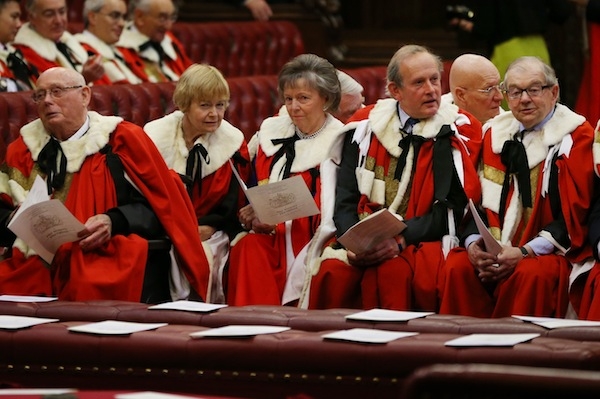Think the Commons is in uproar at the moment over gay marriage? Just wait until the legislation makes its way into the House of Lords. The received wisdom is that equal marriage will go into the upper chamber, but never make it out alive after a savaging from socially conservative peers. But is that true?
If it’s uproar you’re looking for, then you’re unlikely to be disappointed, but the chances of angry words in the chamber translating into embarrassing defeats for the government aren’t quite so high.
Remember that after 13 years of Labour in power, the House has a large liberal-leaning majority. There are 224 Labour peers and 90 Lib Dems. Among them will be a few who oppose the legislation on conscience, but add to that 176 crossbenchers, and even if all 212 Tory peers voted against it, which they obviously won’t, it would still go through on a huge majority.
The most recent activity in this area in the Lords was this time last year, when Tory peer Baroness O’Cathain tabled a motion annulling regulations allowing civil partnerships on religious premises. The regulations only allowed these ceremonies if the governing body of that religion had agreed to them, and the interventions in the debate on the subject made it clear that few peers accepted the Baroness’ argument that this would lead to a slippery slope where vicars and other religious leaders might be forced to conduct the ceremonies. In the end, the motion didn’t even make it to a vote, as it was abundantly clear that it would have been overwhelmingly defeated.
Meanwhile, in March 2010, the Lords voted – albeit with a very low turnout in an evening sitting – in favour of a cross-party amendment which removed sections of the Equalities Bill preventing civil registration in places of worship or religious premises. There was a free vote, and here is the breakdown:

It’s also important to note that the crossbenchers, while independent of party politics, have shown themselves in votes since the Coalition formed to be of a liberal, progressive persuasion. For instance, on 14 March, the Government was defeated three times in one day on the Legal Aid, Sentencing and Punishment of Offenders Bill, and each rebellion saw a sizeable group of crossbenchers vote against the government. Similarly, Lord Best was joined by 72 fellow crossbenchers, Labour and a small crop of Lib Dems to defeat the government on the ‘bedroom tax’ in December 2011. These are obviously very different issues, but a source in the Lords tells me that voting patterns like this demonstrate that it is ‘wishful thinking’ that gay marriage will languish in the Other Place for long.
This is important for Cameron, not just because of principle, but because if he gets the legislation through Parliament soon enough, then he can allow tempers to calm, and voters to forget the angry words on both sides by the time they go to the polls in 2015. His hope will be that by then, everyone will have forgotten what all the fuss is about.







Comments